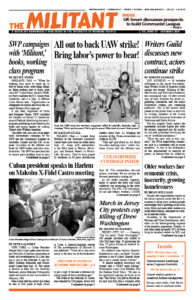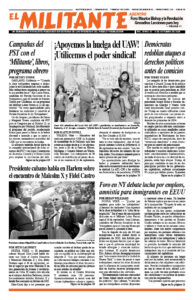NEW YORK — Cuban President Miguel Díaz-Canel spoke at the United Nations and a wide range of meetings during a week-long visit here starting Sept. 17. He called for ending the U.S. economic war on Cuba and for Cuba’s removal from the State Department’s list of “State Sponsors of Terrorism.”
“For more than 60 years Cuba has suffered from a suffocating economic blockade, conceived to depress its income and standard of living, to make it endure continued shortages of food, medicine and other basic goods and restrict its possibilities of development,” Díaz-Canel told the U.N. General Assembly Sept. 19.
The U.S. rulers have never forgiven the Cuban people for overthrowing the Fulgencio Batista dictatorship and, under the leadership of Fidel Castro, carrying out the first socialist revolution in the Americas. Since then every U.S. president — Democrat and Republican alike — has tried to strangle the revolution.
It’s “a cruel, silent, extraterritorial economic war,” Díaz-Canel said. “It’s accompanied by a powerful machine of political destabilization, with multi-million-dollar funds approved by the U.S. Congress with the aim of capitalizing on the shortages caused by the blockade to undermine the constitutional order of the country.”
Washington “has tried to block supplies of fuel and lubricants to our country,” he said, and prohibits “access to goods and technology, including medical equipment, that has more than 10% U.S. components.”
During the COVID-19 pandemic, Washington kept tightening the screws. “The U.S. government pressured companies to not supply medicinal oxygen and pulmonary ventilators that Cuba needed” to combat the disease.
In face of that challenge, “our Cuban scientists created vaccines and developed pulmonary ventilators,” he said, “and we put those at the disposition of other countries around the world!”
Cuba has thousands of health care workers who volunteer as part of Cuba’s internationalist medical missions, a conquest of the socialist revolution. But Washington “openly threatens sovereign governments who request this aid to meet the public health needs of their people,” Díaz-Canel said.
“Based on this arbitrary and fraudulent accusation” that Cuba sponsors terrorism, he said, Washington “extorts hundreds of banks and financial institutions all over the world and forces them to choose between maintaining relations with the U.S. or their ties with Cuba.”
800 million hungry people on planet
“Almost 800 million people suffer from hunger on a planet that produces enough to feed everyone,” the Cuban president said. “More than 760 million people, two-thirds of them women, don’t know how to read or write.”
Wall Street, the IMF and the rest of “the international financial architecture perpetuates a system of domination that increases underdevelopment and reproduces a model of modern colonialism.”
Díaz-Canel also spoke at the U.N. Summit on Sustainable Development Goals, representing the Group of 77 plus China, which Cuba currently chairs, and held a series of meetings with people active with science and technology; representatives of a number of religious denominations; and with artists, writers and academic figures. He also met with philanthropists, business owners, and lawyers to promote more ties between the people of Cuba and the U.S.
At a Sept. 22 meeting with Cubans who live in the U.S., Díaz-Canel gave a sober description of the economic challenges confronting Cuba.
We face “a very tense economic situation,” he said, partly a result of factors outside the government’s control. This includes the aftermath of the COVID-19 pandemic, “the international economic crisis and the effect of the war in Europe,” referring to the war in Ukraine.
There are also “internal problems of our economy, the socio-economic structure of the country and the necessary transformations that need to be made even within the context of the current difficulties.” The Cuban leadership is working to resolve these challenges, he said.
At the same time, Díaz-Canel said, no nation “has been subjected to such a broad, multifaceted and persistent hostile policy like that applied by the U.S. government against Cubans.”
“Our message is one of unity, patriotism and openness toward all who wish to contribute” to defending Cuba’s sovereignty, he said. “We will listen to everyone with respect, even if we have disagreements of various kinds.”
On his last full day in New York, Díaz-Canel spoke to a meeting of over 700, many who came from around the country to participate, initiated by the People’s Forum. Yván Gil Pinto, the foreign minister of Venezuela, also spoke.
Despite the “tightening of the blockade” and all the economic problems that causes for Cuba, Díaz-Canel said, “we remain committed to protecting the socialist system for which so many generations of Cubans have sacrificed.
“We will never abandon the principle of solidarity, not even at the moments of the greatest material limitations,” he said. “We will continue sharing, not what’s left over, but what we have.”

